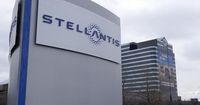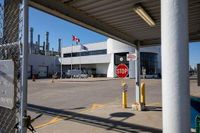Stellantis NV, the automotive giant known for its Ram trucks and Jeep vehicles, has announced significant layoffs and production halts in response to President Donald Trump's newly implemented 25% tariffs on imported vehicles. The decision, made public on April 3, 2025, will see 900 workers temporarily laid off across five U.S. facilities, alongside the idling of assembly plants in Canada and Mexico.
According to reports, the affected U.S. facilities include powertrain and stamping plants that supply parts for the Windsor Assembly Plant in Ontario, Canada, and the Toluca Assembly Plant in Mexico. The Windsor facility, which produces the Chrysler Pacifica and Voyager minivans, as well as the Dodge Charger Daytona, will halt operations for two weeks. Meanwhile, the Toluca Assembly Plant, responsible for manufacturing the Jeep Compass and Jeep Wagoneer S, will remain idle for the entire month of April.
Stellantis shares reflected the turmoil, dropping 7.7% to $10.40 during morning trading in New York, mirroring a broader decline in U.S. stocks amid fears of an escalating trade war. The company's Chief Operating Officer for the Americas, Antonio Filosa, communicated the challenges posed by the tariffs in a letter to employees. He stated, "We are continuing to assess the medium- and long-term effects of these tariffs on our operations, but also have decided to take some immediate actions, including temporarily pausing production at some of our Canadian and Mexican assembly plants."
Filosa's message emphasized the importance of resilience and discipline as the company navigates this uncertain landscape. He assured employees that Stellantis is committed to maintaining its competitive edge and continuing to deliver quality products. However, the layoffs have drawn sharp criticism from labor leaders.
Shawn Fain, President of the United Auto Workers (UAW), expressed outrage at the layoffs, calling them "a completely unnecessary choice that the company is making." He pointed out that Stellantis has the resources and capacity to employ more workers in the U.S., stating, "Stellantis continues to play games with workers’ lives. As we’ve shown time and again, they’ve got the money, the capacity, the product, and the workforce to employ thousands more UAW members in Michigan, Indiana, and beyond."
In Canada, the Unifor union, which represents Stellantis workers, echoed these sentiments. Lana Payne, Unifor's president, remarked that the layoffs were a direct consequence of the tariffs, noting, "Unifor warned that U.S. tariffs would hurt auto workers almost immediately and in this case the layoffs were announced before the auto tariff even came into effect." She added, "Trump is about to learn how interconnected the North American production system is the hard way, with auto workers paying the price for that lesson."
The tariffs, which took effect at midnight on April 3, 2025, impose a substantial 25% tax on all vehicles imported into the U.S., a sharp increase from the previous base tariff rate of 2.5%. This new policy not only affects vehicles but also key auto parts and components, prompting immediate action from automakers like Stellantis.
Stellantis is not alone in grappling with the implications of these tariffs. Other automakers are also assessing their strategies in light of the new regulations. In a broader context, the tariffs are part of a larger trade policy shift under the Trump administration aimed at boosting domestic manufacturing but have raised concerns about retaliatory measures from trading partners.
As part of its response to the tariffs, Stellantis had previously offered buyouts to workers in March, indicating a proactive approach to workforce management amidst the uncertainty. Filosa has stated that the company is collaborating with various stakeholders, including government officials, unions, suppliers, and dealers across North America, to develop a strategic response to the tariffs.
While the immediate effects of the tariffs are being felt through layoffs and production halts, the long-term implications for the automotive industry remain uncertain. Industry analysts are closely monitoring the situation, as the interconnected nature of North American manufacturing means that changes in one area can have ripple effects throughout the entire industry.
In summary, Stellantis' decision to lay off workers and halt production in response to President Trump's tariffs underscores the challenges facing the automotive industry as it navigates a rapidly changing trade landscape. With labor leaders calling for accountability and the company striving to adapt, the coming weeks will be critical in determining how Stellantis and its workforce will weather this storm.







